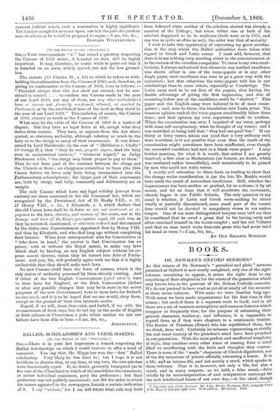BALLIOL SCHOLARSHIPS AND VERSE-MAKING.
[TO THE EDITOR OF THE "SPECTATOR.")
SIR,—There is in your last impression a remark respecting the Balliol Scholarships on which I would venture to offer a word of comment. You say that Mr. Higgs has won the " first " Balliol scholarship. Very likely he has done so ; but I hope it is not invidious to observe that, in my time, at any rate, the two scholars were theoretically equal. It, no doubt, generally transpired (as in the case of the Class lists) to which of the candidates the examiners, or rather individual examiners, gave the preference ; but their preference was not publicly announced ; nor did the order in which the names appeared in the newspapers furnish a certain indication of it. I say "certain," for I am not aware what rule may have been followed when neither of the scholars elected was already a member of the College ; but when either one or both of the scholars happened to be in residence (both were so in 1855, and one was so quite as often as not), the order was that of seniority.
I wish to take this opportunity of expressing my great satisfac- tion at the step which the Balliol authorities have taken with regard to Greek and Latin verses. I must add, however, that there is to me nothing very startling either in the announcement or in the success of the verseless competitor. To recur to my own recol- lections, I always understood that whenever any marked excellence was shown either in one of the verse-papers or in any other single paper, such excellence was sure to go a great way with the examiners ; but that otherwise the verse-papers told less in our scholarships than in some others, especially at Cambridge. The Latin essay used to be set first of the papers, thus having the double advantage of giving the first impression, and also of occurring before any of the candidates could be "shelved." This paper and the English essay were believed to be of most conse- quence; and, next to them, the translation into Latin prose. The common opinion ranked the verse-papers considerably below these three ; and that opinion my own experience tends to confirm. When the examination was over, I inquired of my tutor, perhaps with some self-complacency, what he thought of my verses ; and I was mortified at being told that "they had one good line." If my thirty or forty verses, minus one (and that a very ordinary one) were worthless, is it not possible that even then the result of the examination might sometimes have been unaffected, even though the successful candidate had sent in a blank verse-paper? I may further mention, for what it is worth, that unless I am greatly deceived, a first class in Moderations (an honour, no doubt, which was conferred rather bountifully), used occasionally to be gained by men who could not write verses.
I merely call attention to these facts as tending to show that the change under consideration is (as the late Mr. Buckle would have said) the result of antecedent conditions. Still, whether the improvement has been sudden or gradual, let us welcome it by all means, and let us hope that it will accelerate the movement, already begun in our Public Schools. The only question to my mind is whether, if Latin and Greek verse-making be either wholly or partially discontinued, some small part of the vacant time should not be devoted to compulsory verses in our native tongue. One of our most distinguished lawyers once told me that he considered that he owed a great deal to his having early and often exercised himself in the heroic couplet ; and has not Voltaire said that no man could write first-rate prose who had never tried his hand at verse ?—I am, Sir, &c.,
AN OLD BALLIOL SCHOLAR.


































 Previous page
Previous page